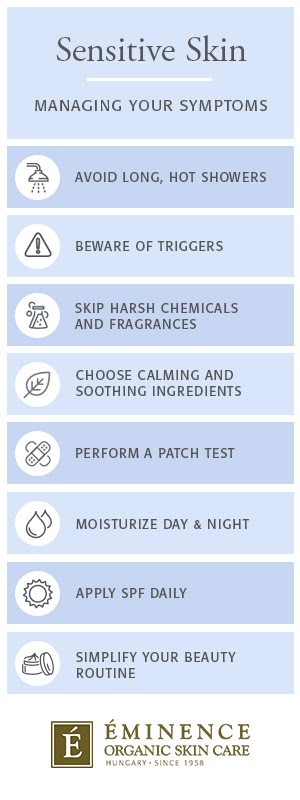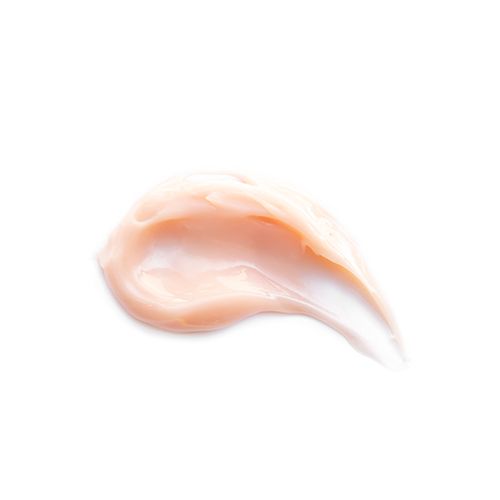A Skin Care Routine For Sensitive Skin
Are you dealing with sensitive skin? Sensitive skin is often genetic and can react to many different variables, from hormonal imbalances and poor diet to changes in weather and certain chemicals or ingredients. It is important to ensure consistent skin care regimen so that your sensitive skin stays calm and clear. We've put together some tips for easing your symptoms, as well as skin care products for sensitive skin to improve the way your skin behaves.
8 tips for sensitive skin
You may not be able to change your sensitive skin type, but there are several tips you can follow to keep your skin type right sensitive skin symptoms under lock and key:
1. Avoid long, hot showers
It's time to swap out your long, hot showers for shorter, lukewarm ones. Why? Sensitive skin often reacts negatively to the effects of heat, which destroys the skin's lipid barrier. Melissa Piliang, MD says to HERSELF: “Think about it like butter on a knife. If you put it under cold water, the fat will not go anywhere on the knife. However, if you put it under warm water, these lipids will melt away. It's the same problem with the lipid layer in our skin. If you soak your skin in hot water or use harsh soaps, this outer protective layer of fat is easily washed away. "
2. Watch out for triggers
One of the best ways to deal with your sensitive skin symptoms is to be aware of the environmental and lifestyle triggers that are causing your skin to react. The more you know, the better you can identify them and take precautions. Triggers differ from person to person, but often include:
- Seasonal changes
- Stress and lack of sleep
- pollution
- DehydrationIf you
3. Skip harsh chemicals and artificial fragrances
Strong chemicals and artificial fragrances are the main contributors to lipid barrier damage. To keep your skin healthy, Women's Health Advises: "Look for skin care products that are fragrance-free and paraben-free, two common causes of irritation and relapses." Choose natural skin care brands like Eminence Organics that do not use parabens, sodium lauryl sulfates, synthetic dyes, petrochemicals and phthalates in their formulations.
4. Choose soothing ingredients
Also, reach for products that contain soothing ingredients. “It's important to choose natural ingredients whenever possible, regardless of your skin type. However, this is particularly important for sensitive skin, ”he explains Dr. Hooman Khorasani, Dermatological and Cosmetic Surgeon. “These products can be described and contain as hypoallergenic, mild, or gentle natural ingredients such as coconut oil, aloe vera, chamomile, vitamin E and shea butter, ”says Dr. Khorasani.
Ingredients should be chosen based on their anti-inflammatory properties and their ability to improve your skin's lipid barrier. In summary, these include:
- Hyaluronic acid
- Aloe vera
- Vitamin E.
- olive oil
- chamomile
- Shea butter
- Sunflower oil
- Coconut oil
5. Perform a patch test
We were all there after a skin care purchase. Excitingly trying out all of the new products at once is something almost everyone has done at one time or another. However, this can lead to an undesirable reaction, especially on sensitive skin types. Instead, always do a patch test before adding new products to your product Skin care routine. As Women's Health recommends: “Before applying, do a test run on a small, inconspicuous patch of skin (like behind your ear). Wait at least 24 hours for any signs of irritation, redness, or other skin defects. If your skin is hypersensitive, repeat this test run on a patch next to your eye. All right? You can safely apply with dedication. "
6. Moisten
One of the best ways to maintain a healthy lipid barrier is to keep it hydrated – day and night. An effective one Moisturizer replenishes the outer layer of the skin and prevents water loss, preventing potential irritants from entering. When choosing a moisturizer, we recommend looking for ingredients that are high in fatty acids (like shea butter, jojoba oil, and coconut oil), as well as humectants (like hyaluronic acid) that increase hydration and lock in moisture.
7. Apply SPF
Sensitive skin reacts particularly well to the sun's rays – and UV protection is a must. However there Dermatologist Shari Marchbein tells us Curls: "People with sensitive skin can have difficulty finding sunscreens as most are made with chemical UV blockers that can sting, sting, irritate, and redden when applied to the skin." We recommend using a mineral sunscreen, which contains physical blockers like zinc oxide and titanium dioxide to protect your skin from harmful UV rays.
8. Simplify your beauty routine
Sensitive skin is easily overwhelmed by a plethora of products. Dr. Ilyse Lefkowicz Says Refinery29: “I always recommend patients with sensitive skin to make their skin care easier. Use gentle cleansing and moisturizing creams without a lot of cleansers and fragrances to get the basics right. Then introduce other active substances slowly one at a time. “As always, do a patch test before adding any more products to your routine.
A step-by-step routine for sensitive skin care
With sensitive skin, less is more. We recommend starting with some delicate skin care products in conjunction with these essentials Skincare Steps for Best Results.
Clean
Dermatologists recommend using a gel or cream cleaner that will remove contaminants without causing irritation or unnecessary dryness. To cleanse, use your fingertips instead of a washcloth or brush, rinse with cold water, and gently pat your face dry. Above all, don't overdo it. Washing your face once a day should be enough to keep your skin healthy.
We recommend: Stone Crop Gel Wash
This gel cleanser gently washes off excess dirt and oil without removing the skin too much. Stone plant deeply hydrates, while chamomile and shea butter soothe and restore dry skin.
volume
Say goodbye to alcohol-based astringent toners that can make your face firm and itchy. Instead, use a toner or facial mist with soothing ingredients to help reduce the appearance of redness and inflammation.
We recommend: Hydrating mist of stone culture
Refreshing Stone Crop Hydrating Mist is infused with stone fruit juice and aloe to moisturize and heal dry skin on the face, leaving the complexion soft and fresh. Meredith Their 5-star rating states, “I spray my face after cleansing and before I apply my night moisturizer or day sunscreen and LOVE it! I have fairly sensitive skin that is easily irritated and itchy and that always soothes, hydrates and smooths my skin. It's amazing how much better my skin looks and feels after I spray it! I can't be without it! Thank you, Eminence! "
Moisturize
For sensitive skin, look for moisturizers that not only replenish your skin's moisture barrier, but also contain soothing ingredients that soothe and soothe your complexion.
We recommend: Calm skin chamomile moisturizer
Chamomile, calendula, and arnica combine in this moisturizer to soothe chapped cheeks and reduce redness due to dryness. If your The skin is both sensitive and oily. Our experienced beauticians recommend the light rose hip whip moisturizer, which helps reduce discomfort and even the appearance of slightly irritated dry skin.
An improved routine for sensitive skin care
After you've got the basics down, it's time to let the fun begin. We recommend introducing these extras into your skin care routine one at a time.
peeling
Sensitive skin can still be gently peeled off. Keep the scrub once or twice a week. It can help remove dead skin cells and refresh your skin without causing excessive peeling.
We recommend: Calm chamomile peeling
This scrub uses lactic acid and mandelic acid to gently exfoliate sensitive skin without irritation. It contains soothing ingredients like chamomile, calendula, and arnica that help soothe redness caused by dryness and leave skin soft, smooth, and revitalized.
Face mask
Face masks are one of the best ways to soothe sensitive skin. They not only offer the ultimate pampering experience, but also provide the skin with soothing ingredients.
We recommend: Calm skin Arnica Masque
Eminence Organics Product supervisor and certified beautician Alicia Hawthorne says this gentle mask, “helps reduce signs of redness and soothes and soothes dry skin. Arnica, marigold, and shea butter work together to soothe dry, sensitive skin. " Curls is also a fan of this soothing treatment, calling it one of the best face masks for reducing redness.
To treat
We recommend: Facial Recovery Oil.
This award winning face oil is formulated with the purest possible Biodynamic® ingredients for firming and hydrating sensitive skin. Alicia Says: “Amazing to hydrate, soothe and reduce redness from dryness. It can be applied under your moisturizer, worn on its own, or used simply by adding a few drops to your moisturizer. It also contains beautiful oils to soothe dry skin: ylang ylang, clary sage oil, and sage leaf extract. "
D.o Do you have sensitive skin? Browse more of our skin care products. specially selected for sensitive skin types and experience them at an Eminence Organics Spa partner in your area.
We'd love to hear which products soothe and soothe your complexion! Let us know your recommendations in the comments below and join the conversation on social media.
Product selection

Calm chamomile peeling
VIEW PRODUCT
Product selection

Calm skin Arnica Masque
VIEW PRODUCT
Product selection

Facial Recovery Oil
VIEW PRODUCT








